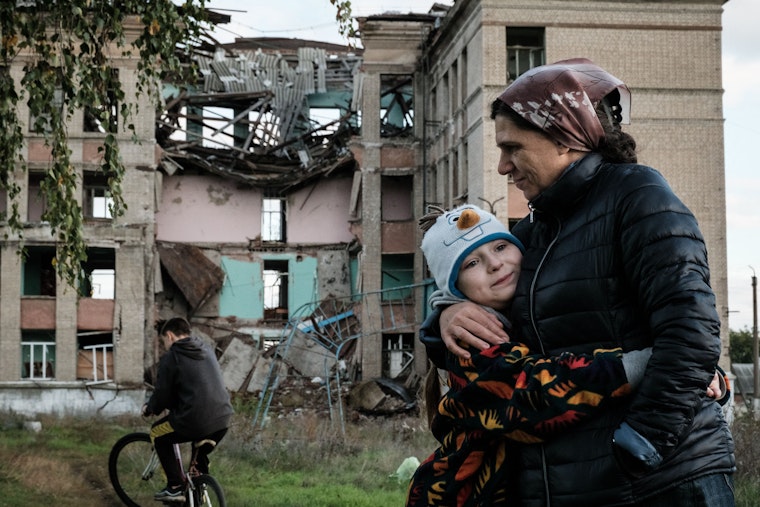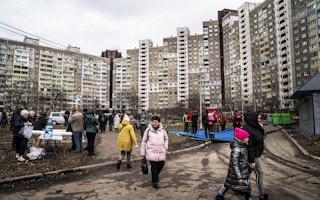Q&A: Forging a Future Under Fire

February 24 marks the one-year anniversary of Russia’s all-out invasion of Ukraine. Reporters have faithfully followed the conflict, as Russia seeks to expand its fighting force and continues to shell civilians, while Ukraine seeks additional military firepower from the West. Often overlooked amid the battlefield headlines are the many ways Ukrainian civil society has struggled, survived, and thrived under extraordinary conditions. We spoke with Oleksandr Sushko, executive director of the International Renaissance Foundation in Ukraine, about the trials and triumphs of his staff, partners, and grantees—and the efforts to rebuild a battered yet resolute nation that lie ahead.
How are you and your colleagues managing to work through the war?
We have spent a long time now working under war conditions. The first phase—February, March, April of last year—was the most difficult, when many of us were forced to evacuate and work in western Ukraine. In the next phase, from summertime to mid-autumn, we gradually restored our ability to work from our central office. We are now in the third phase, which started in late autumn and continues today. As Russians attack Ukraine’s energy infrastructure, we have had to adapt; some colleagues have gone three, four, five days at a time without power, and there are now planned interruptions almost every day. We are fortunate to have a generator, so even if colleagues lack heat or internet access at home, they can come to the foundation to do their work. We are more optimistic today than we were in November. We have survived half the winter. We hope spring comes soon.
Looking back, we have been calculating what we have done over the past year. In a typical year, the International Renaissance Foundation makes, on average, some 300 grants. In 2022, we made 500 plus. I am enormously proud of my staff at the foundation and all the people who have made such strides under extremely difficult conditions.
What work does that new funding support?
In the first months of the war, our major objective was helping people to survive. Some of our partners were in territories directly affected by the conflict; some evacuated, some lost people and equipment amid the bombs. Some left the country, but most stayed, and, with our help, relocated to safer ground and kept working. We helped provide transport, generators, and other equipment to local hospitals, for example, and aided those who could not help themselves: the elderly, those with children, the sick, and wounded.
As we gradually returned from emergency footing, we turned to work to sustain civil society—human rights groups, independent media, war crime investigators—to help them persevere. Despite the mass destruction inflicted by the Russians, 90 percent of our partners are operational today.

The International Renaissance Foundation and your partners are actively moving forward on plans to rebuild Ukraine. How do you do that, even as the shelling continues?
It’s a complex issue. Of course, the grand rebuilding strategy can only be implemented after the end of the war. But in many areas, we can’t wait until then. Those territories liberated from Russian occupation by Ukraine’s fighting force require immediate support to help people return to live there, and to restore schools, hospitals, and the like.
But longer term, we are developing strategies to ensure public engagement, to ensure communities take ownership over their reconstruction, and to secure civil society participation in promoting transparency and accountability as Ukraine rebuilds. Our foundation is part of this conversation and the policy debates it entails. We are also working with international donors, persuading them to commit and stay engaged on both the domestic and international dimensions of our recovery.
As the war drags on, debate grows about whether allies will continue to provide the same level of military support. Are you worried that there could be a similar “war fatigue” effect on civil society’s work?
It is difficult to maintain a constant level of support. It’s human nature: The longer this goes on, people may lose interest and turn away. At the same time, what’s happening in Ukraine is part of something bigger, reflecting deep deficiencies in the world order. Everyone concerned with democracy, independence, human rights can see the challenges playing out now in Ukraine. I hope people will understand that this conflict is part of a much wider challenge to the world order around us.
We are also learning better how to listen to other nations. Part of building support in the global community for our challenges is to understand the problems of others in the world. It is wrong to only talk about our own problems, our own agenda. We need to be ready to listen to others, and gain more insight and empathy into what they are facing. Ukrainians are learning how to work with global audiences in ways that weren’t available to us before this. We are far removed from the agenda of the Global South, for example. But step by step in dialogue with others, we come to understand their challenges, and what is needed to build bridges to them and help them understand us better.
A year into this conflict, what would you consider civil society’s greatest successes?
There are many independent journalists continuing to work under fire to tell the world what is happening. Human rights groups collecting evidence and building cases to hold Russia accountable for war crimes. Effective fundraising by grantees and partners to help support Ukrainian armed forces, bolster hospitals, keep medical supplies moving, aiding displaced persons and refugees. The Nobel Peace Prize was awarded to the Center for Civil Liberties, which is chaired by a member of our foundation’s board. That was a remarkable recognition of resilience under fire.
But perhaps the greatest achievement, in my view, is seeing Ukrainians expressing ownership over their society. For many years, Ukrainians have harbored a deep distrust of institutions. But this is really changing. Over the past year, people do not as often see themselves as passengers on the train, but rather as engineers, drivers of their own destiny, coming together to protect and defend their country.


